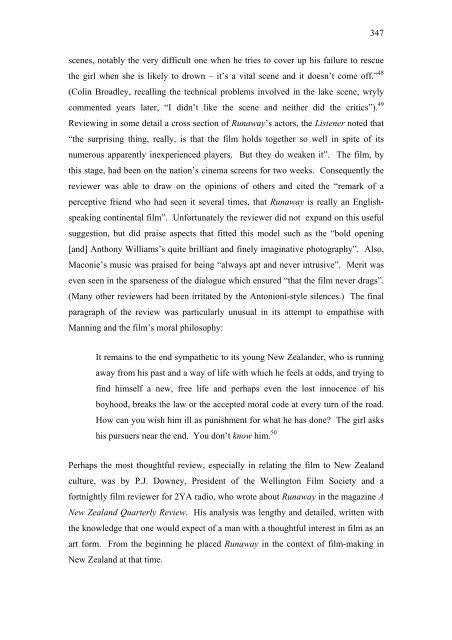Copyright Statement - ResearchSpace@Auckland
Copyright Statement - ResearchSpace@Auckland
Copyright Statement - ResearchSpace@Auckland
You also want an ePaper? Increase the reach of your titles
YUMPU automatically turns print PDFs into web optimized ePapers that Google loves.
347<br />
scenes, notably the very difficult one when he tries to cover up his failure to rescue<br />
the girl when she is likely to drown – it’s a vital scene and it doesn’t come off.” 48<br />
(Colin Broadley, recalling the technical problems involved in the lake scene, wryly<br />
commented years later, “I didn’t like the scene and neither did the critics”). 49<br />
Reviewing in some detail a cross section of Runaway’s actors, the Listener noted that<br />
“the surprising thing, really, is that the film holds together so well in spite of its<br />
numerous apparently inexperienced players. But they do weaken it”. The film, by<br />
this stage, had been on the nation’s cinema screens for two weeks. Consequently the<br />
reviewer was able to draw on the opinions of others and cited the “remark of a<br />
perceptive friend who had seen it several times, that Runaway is really an Englishspeaking<br />
continental film”. Unfortunately the reviewer did not expand on this useful<br />
suggestion, but did praise aspects that fitted this model such as the “bold opening<br />
[and] Anthony Williams’s quite brilliant and finely imaginative photography”. Also,<br />
Maconie’s music was praised for being “always apt and never intrusive”. Merit was<br />
even seen in the sparseness of the dialogue which ensured “that the film never drags”.<br />
(Many other reviewers had been irritated by the Antonioni-style silences.) The final<br />
paragraph of the review was particularly unusual in its attempt to empathise with<br />
Manning and the film’s moral philosophy:<br />
It remains to the end sympathetic to its young New Zealander, who is running<br />
away from his past and a way of life with which he feels at odds, and trying to<br />
find himself a new, free life and perhaps even the lost innocence of his<br />
boyhood, breaks the law or the accepted moral code at every turn of the road.<br />
How can you wish him ill as punishment for what he has done? The girl asks<br />
his pursuers near the end. You don’t know him. 50<br />
Perhaps the most thoughtful review, especially in relating the film to New Zealand<br />
culture, was by P.J. Downey, President of the Wellington Film Society and a<br />
fortnightly film reviewer for 2YA radio, who wrote about Runaway in the magazine A<br />
New Zealand Quarterly Review. His analysis was lengthy and detailed, written with<br />
the knowledge that one would expect of a man with a thoughtful interest in film as an<br />
art form. From the beginning he placed Runaway in the context of film-making in<br />
New Zealand at that time.















